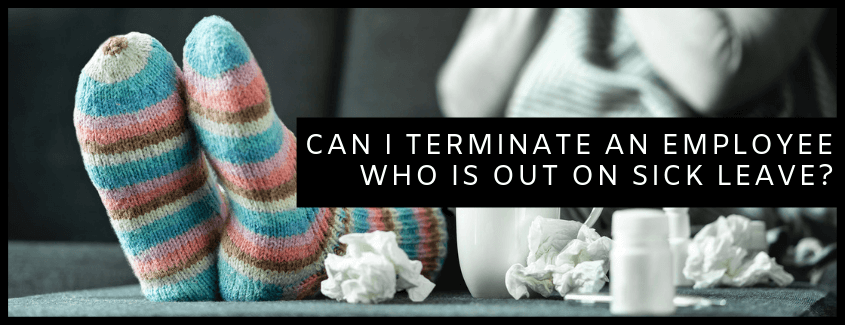Can I Terminate An Employee Who Is Out On Sick Leave?
Are Arizona Employers Allowed To Terminate Employees During A Sick Leave Period?
Unless your name is Donald Trump, you probably find firing employees to be the most excruciating part of your role as employer. Sometimes, when the employee is a bad apple, the decision might not be so difficult, but in many instances firing an employee is a necessity purely based on financial reasons. In these instances, the employee has become your friend and you know that firing them will inevitably lead to some of the most stressful series of events one can experience. It is only natural for your employees to feel angry with you, regardless of your reasons. The last thing you want to give to a fired employee is ammunition to strike back at you. Such ammunition often comes back to haunt employers after they illegally dismiss their employees. Don’t let it happen to you. While illegal employer conduct is broad, this article focuses on instances where an employer should be careful firing an employee who is out on sick leave. If you have any questions about issues contained in this article, please call our office today to speak with an experienced labor and employment attorney.

Employers Must Set Disciplinary Policies
Before moving to the analysis, it is our recommendation that when it comes to employee discipline, you should document, document, document. Follow your disciplinary policy and give warnings. Use performance improvement plans. Follow through. Don’t ignore problematic behavior. Take reports on incidents and put copies in personnel files. The better the paper trail supporting your decision to terminate an employee, the better your chances of avoiding liability for wrongful termination, especially if that employee is out on or has recently been out on sick leave.
How Does At-Will Status Affect An Employee’s Termination?
Though the question appears rather simple and straightforward, it actually requires a significant amount of analysis to determine whether or not you can fire an employee who is out on sick leave. The first step in the analysis is to decide whether an employee is or is not an at-will employee. Generally, when an employment relationship is created without a contract or time limit, the employment is at-will and terminable at pleasure by either the employee or employer. The legal basis for at-will status is that the employment relationship is considered to be like a contract and, at any time, either party may decide to end the relationship1. So, generally, an employer can terminate the employee for any reason and at any time without any notice.
Contracts are presumed to be at-will unless there is evidence to the contrary. There are two main common law exceptions to at-will employment where an employer may be liable for an improper termination:
Breach Of An Implied Contract
To find an implied contract, courts look to a variety of factors including personnel policies or practices of the employer, employee’s longevity of service, actions or communications by employer reflecting assurances of continued employment, and the practices of the industry in which the employee is engaged. If there is a contract, whether express or implied, that defines the relationship differently from at-will employment, then an employer can only fire an employee in accordance to such a contract, even if they are on sick leave.
Discharge Violates Public Policy
For a discharge to violate public policy, the policy in question must be sufficiently clear to provide a basis for a remedy, the policy must involve matters that affect society at large, and the policy must be fundamental, substantial, and well established at the time of the discharge. Because firing an employee while out on sick leave probably does not affect society at large, it is unlikely that it will become a fair defense for overturning an employee’s at-will status.
If the employee on sick leave is determined to be an at-will employee, then they may be freely terminated by the employer as long as they are not protected under any other laws (e.g., the Family and Medical Leave Act, the Americans with Disabilities Act, etc.). If the employee is not an at-will employee, then you can only terminate them in accordance with the contract governing the employer/employee relationship. Even if your employee is an at-will employee, it is critical that you understand whether or not they are protected by one of the categories below.2

How Can Employees Qualify For The Family And Medical Leave Act?
The Family and Medical Leave Act (“FMLA”) allows eligible employees to take up to twelve weeks off of work during a twelve-month period for a number of reasons, which include the birth of a child, the adoption of a child, the care for a child, spouse, or parent with a serious health condition, or for the employee’s own serious health condition.3 Serious health condition is typically defined as an illness, injury, impairment or physical or mental condition that requires inpatient care4 or continuing treatment by a health care provider. If your employee is covered by FMLA, it is illegal to fire, discipline, or otherwise retaliate against them for taking the leave that is expressly granted to them.5 There is also a presumption that if you terminate an employee shortly after he or she returns to work that it is evidence of retaliation.
Additionally, employees who take FMLA leave are generally entitled to reinstatement to the same position they were in before the leave and the employer must continue to provide the same healthcare coverage during the employee’s absence as they did while the employee is present.6 It follows that if you fire your employee who is out on sick leave for a serious FMLA health condition, then your employee might have a legal claim against you for wrongful termination.
Here are several examples of FMLA serious health conditions that could protect your employee from being fired while out on sick leave under FMLA:
- Incapacity for pregnancy or the care of a newborn child after birth
- Chronic conditions that require frequent visits to a doctor
- Continuous treatment by a doctor that results in incapacity
- Chronic conditions that require frequent visits to a doctor
- Permanent or long-term conditions (e.g., Alzheimer’s, a severe stroke, etc.)
- Serious conditions requiring multiple treatments and long recovery periods (e.g., cancer).
- Treatment for substance abuse by a healthcare provider
When The Americans With Disabilities Act Protects An Employee
Sick time taken by your employee might also qualify for protection from termination under the Americans with Disabilities Act (“ADA”). Under the ADA an employer7 is forbidden from discriminating against a qualified individual with a disability. The ADA requires that employers: 1) treat employees the same if there is no reasonable accommodation necessary to do the job and 2) provide reasonable accommodations if a person with a disability requires reasonable accommodations to perform the essential functions of their position. For example, if an employee’s treatments for his disease make it difficult for him to come to work, is it reasonable for you to allow the employee to work from home? Employers are only required to provide reasonable accommodations for employees with disabilities when the accommodations do not impose an undue hardship on the employer. For example, it might not be feasible for the employer to allow an employee to work from home when the nature of the position involves physical labor. Generally, employers are allowed to terminate an employee without violating the ADA if the employee with a disability is completely unable to perform their job with or without reasonable accommodation.

Worker’s Compensation Laws In Arizona
Is the sick time taken by your employee related to any work-related injuries? If so, your employee might qualify for protection under Arizona workers’ compensation laws. Workers’ compensation in Arizona provides basic entitlement to compensation for employees if they are injured in the course of their work. Arizona state compensation laws do not protect employees enrolled in workers’ compensation from being terminated, but an employer is prohibited from terminating an employee because they filed a workers’ compensation claim. Such conduct would have prohibited retaliation under Arizona state and federal law. If an employee is fired while receiving workers’ compensation benefits, his or her workers’ compensation benefits will not end, but continue until they have recovered or reached their maximum level of improvement.
It is usually in the best interest of employers to attempt to accommodate an injured employee after an on-site injury, if possible, in order to avoid disability exposure. However, there is also no statute or rule that mandates Arizona employers to hold onto a job position for an injured employee until they are able to recover and return to work. If the injured employee’s position is filled while on leave, it is critical that you maintain detailed documentation demonstrating that the employee’s position was filled by a new employee due to an acute need to fill the position on a regular basis. By doing so, you can thwart any suspicion that the employee was terminated because of their attempts to exercise their workers’ compensation rights.
What Constitutes Retaliation Under Arizona State Law?
In November 2016, the Fair Wages and Healthy Families Act was passed through a ballot initiative. In addition to establishing an increasing state minimum wage and stronger paid sick leave laws, the act created retaliation provisions for employers who failed to comply. Under the paid sick leave laws, an Arizona employee is entitled to accrue one hour paid sick leave for every thirty hours worked.8 Once the employee obtains this sick leave, any adverse actions you take against the employee for using their paid sick leave could constitute retaliation. If the adverse actions occur within ninety days of the employee’s exercising their rights under the Fair Wages and Healthy Families Act, retaliation is presumed and can only be overcome if the employer shows that the adverse actions were only taken for a permissible reason. For this reason, you should be very cautious when disciplining employees while they are on paid sick leave and ensure that your HR employees are documenting all adverse action proceedings thoroughly. After all, proving any legal action by clear and convincing evidence is no easy feat.
Take The Right Decisions By Contacting Our Mesa Business Attorneys
Realistically, the unique circumstances of your situation will determine what measures to take in protecting yourself from frivolous lawsuits and the most challenging part of all is that the law is constantly changing. If you have been accused of wrongfully terminating your employee who was out on sick leave, then you should speak with an experienced Arizona employment attorney today.
______________
1 See A.R.S. § 23-1501.
2 These protected categories are not exclusive protections for employees out on sick leave, but rather a few categories that commonly arise as a result of termination of sick individuals.
3 FMLA applies exclusively to employers of 50 or more employees.
4 Inpatient care involves an overnight stay in a hospital or other care facility.
5 There are some exceptions to this general rule not stated here.
6 When a leave of absence is foreseeable, an employee must give their employer at least 30-days notice of their intent to take leave.
7 ADA applies exclusively to employers of 15 or more employees.
8 The law applies to all employees who are full-time, part-time, temporary or on-call with a small business concession. While large employers with at least 15 employees can’t cap accruals until they reach 40 hours, smaller employers may impose a 24-hour accrual cap.
______________
Approved By:

Brad Denton – Denton Peterson Dunn
Mesa Location
1930 N Arboleda #200
Mesa, AZ 85213
Office: 480-325-9900
Email: [email protected]
Website: https://arizonabusinesslawyeraz.com
Scottsdale Location
7272 E Indian School Rd #540-132
Scottsdale, AZ 85251
Phone: 480-325-9919
Email: [email protected]
Website: https://arizonabusinesslawyeraz.com